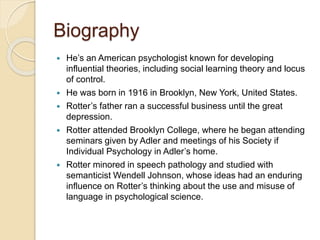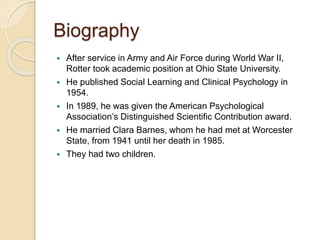Jullian rotter
- 1. Jullian Rotter (October 22, 1916 – January 6, 2014) Reported by: Erika Bianca Laude
- 2. Biography He’s an American psychologist known for developing influential theories, including social learning theory and locus of control. He was born in 1916 in Brooklyn, New York, United States. Rotter’s father ran a successful business until the great depression. Rotter attended Brooklyn College, where he began attending seminars given by Adler and meetings of his Society if Individual Psychology in Adler’s home. Rotter minored in speech pathology and studied with semanticist Wendell Johnson, whose ideas had an enduring influence on Rotter’s thinking about the use and misuse of language in psychological science.
- 3. Biography After service in Army and Air Force during World War II, Rotter took academic position at Ohio State University. He published Social Learning and Clinical Psychology in 1954. In 1989, he was given the American Psychological Association’s Distinguished Scientific Contribution award. He married Clara Barnes, whom he had met at Worcester State, from 1941 until her death in 1985. They had two children.
- 4. Social Learning Theory Rotter moved away from theories based in psychoanalysis and behaviorism and developed a social learning theory. In Social Learning and Clinical Psychology, Rotter suggested that the expected effect or outcome of the behavior has an impact on motivation of people to engage in that behavior. Personality represents an interaction of individual with his or her environment. To understand behavior, one must take both the individual and the environment into account. Personality is relatively stable set of potentials for responding to situations in a particular way. He sees personality, and therefore behavior as always changeable. Change the way the person thinks, or change the environment the person is responding to, and behavior will change. Rotter conceives people in an optimistic way. He sees them as being drawn forward by their goals, seeking to maximize their reinforcement, rather than just avoiding punishment. People wish to avoid negative consequences, while desiring positive results or effects. This social learning theory suggests that behavior is influenced by social context or environmental factors, and not psychological factors alone.
- 6. Behavior Potential Behavior potential is the likelihood of engaging in a particular behavior in a specific situation. In any given situation, there are multiple behaviors one can engage in. For each possible behavior, there is a behavior potential. The individual will exhibit whichever behavior has the highest potential.
- 7. Reinforcement Value Reinforcement is another name for the outcomes of our behavior. Reinforcement value refers to the desirability of these outcomes. Things we want to happen, that we are attracted to, have a high reinforcement value. Things we don't want to happen, that we wish to avoid, have a low reinforcement value. As with expectancy, reinforcement value is subjective, meaning that the same event or experience can vastly differ in desirability, depending on the individual's life experience.
- 8. Expectancy Expectancy is the subjective probability that a given behavior will lead to a particular outcome, or reinforce. Having "high" or "strong" expectancies means the individual is confident the behavior will result in the outcome. Having low expectancies means the individual believes it is unlikely that his or her behavior will result in reinforcement. If the outcomes are equally desirable, we will engage in the behavior that has the greatest likelihood of paying off. Expectancies are formed based on past experience. It is important to note that expectancy is a subjective probability, because one common source of pathology is irrational expectancies.
- 9. Predictive Formula BP = f(E & RV) This formula can be read as follows: behavior potential is a function of expectancy and reinforcement value. Or, in other words, the likelihood of a person's exhibiting a particular behavior is a function of the probability that that behavior will lead to a given outcome and the desirability of that outcome. If expectancy and reinforcement value are both high, then behavior potential will be high. If either expectancy or reinforcement value is low, then behavior potential will be lower.
- 10. Psychological Situation Although the psychological situation does not figure directly into Rotter's formula for predicting behavior. Rotter believes it is always important to keep in mind that different people interpret the same situation differently. Again, it is people's subjective interpretation of the environment, rather than an objective array of stimuli, that is meaningful to them and that determines how they behave.
- 11. Locus of Control Locus of control refers to people's very general, cross- situational beliefs about what determines whether or not they get reinforced in life. People can be classified along a continuum from very internal to very external. People with a strong internal locus of control believe that the responsibility for whether or not they get reinforced ultimately lies with themselves. Internals believe that success or failure is due to their own efforts. In contrast, externals believe that the reinforcers in life are controlled by luck, chance, or powerful others. Therefore, they see little impact of their own efforts on the amount of reinforcement they receive.










